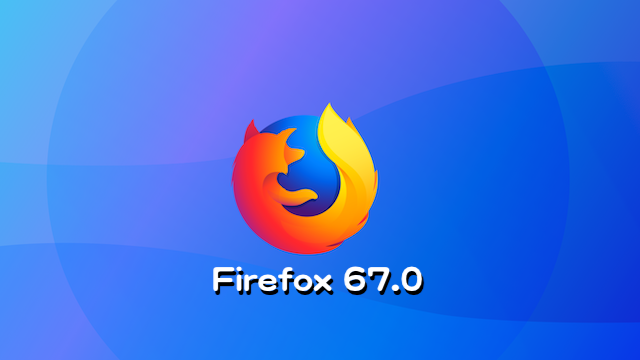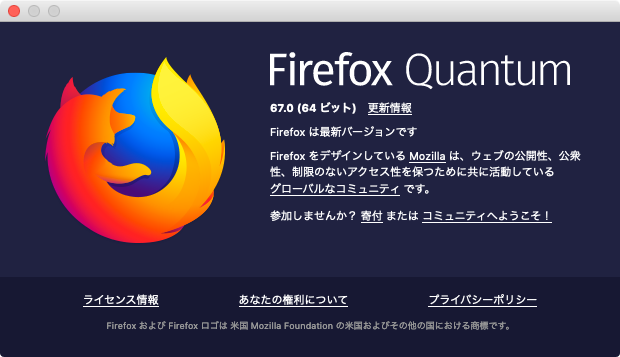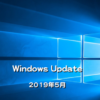Mozillaは2019年5月22日(現地時間5月21日)、Windows、Mac、Linuxなどデスクトップ向けのWebブラウザFirefoxの定期的なメジャーアップデートとなる「Firefox 67.0」を正式リリースしました。

今回リリースされたMozillaのWebブラウザ最新バージョン「Firefox 67.0」では、未使用のタブを中断、起動するまでコンポーネントの初期化を遅らせるなどのいくつかの機能変更により、Firefoxのパフォーマンスが向上しています。また、数多くの新しい機能が追加されています。
Firefox 67.0デスクトップ版リリースノート
新機能
- 以下の変更によるパフォーマンスの改善:
- ページ読み込みにおける
setTimeoutの優先度の低下 - スタートアップ時のコンポーネントの初期化の遅延
- ページ読み込みにおける描画の高速化かつ回数の低減
- 未使用のタブのサスペンド
詳細は Mozilla blog を参照されたい
- ページ読み込みにおける
- コンテンツブロッキング設定 から、既知の暗号通貨マイニングやフィンガープリント採取をブロックできるようになった
- キーボードアクセシビリティの向上。ツールバーおよびツールバーオーバーフローメニューに キーボードから完全にアクセスできるようになった: アドオン、ダウンロードパネル、オーバーフローメニュー、ページアクション、Firefox メニューなどにアクセスできるようになった
- プライベートブラウジング における 利便性及びセキュリティの向上:
- プライベートブラウジングモードで保存されたパスワード
- プライベートタブにおける拡張機能の動作の可否
- Firefox の利用を容易にする多数の新機能:
- Firefox アカウントでの同期がいつ行われたかをより透明化する ツールバーメニュー の追加。メニューアイコンにはアバターが利用される
- アドレスバーのページアクションメニューからタブの ピン留め ができるようになった
- ピン留めなどのその時に応じた有用な機能がハイライト表示されるようになった
- メインメニューおよびログイン情報の自動補完 から、ログイン情報へのアクセスが容易になった。詳細は パスワードマネージャー を参照されたい
- 他のブラウザーからのデータのインポートが、ファイルメニューからできるようになった
- 他にインストールされた Firefox の起動を 既定で個別に行えるようになった。これにより、ベータ版とリリース版の Firefox を同時に起動 できるようになった
- データ漏えいのおそれや安定性に問題のある古いバージョンの Firefox の起動が抑止されるようになった
- ‘dav1d’ と呼ばれるより新しく効率の良い AV1 デコーダーへのアップふれーど
- NVIDIA のグラフィックカードを搭載した Windows 10 デスクトップ環境において、WebRender が 徐々に有効化されていく
- JavaScript コンパイラーにおける ARM64 Windows デバイスのサポート
- FIDO U2F API が有効化され、Google アカウントへの登録が可能となった
- 一部のユーザーを対象として、レイアウトやコンテンツの変更などの Pocket の改善実験 が行われる
修正
- Various security fixes
変更
- 30boxes.com を対象とした webcal: リンクが機能しなくなった
- プライベートウインドウにおける拡張機能の変更: 新規にインストールされる拡張機能は、ユーザーが明示的に許可しない限りプライベートウインドウでは機能しなくなった
- Firefox スクリーンショットサーバーへの スクリーンショットのアップロードおよび共有ができいなくなる。既存のスクリーンショットを保存したい場合には、サーバーがシャットダウンされる前に エクスポート する必要がある
- Emoji 11.0 🥳 のサポートのための Twemoji Mozilla フォントの同梱
- 日本の新しい元号「令和」に適合させるための、フォントおよび日付の表示の調整
開発者向け
- 開発者ツールパネルにおいて、変更した CSS のコピーが可能となった。変更全体および個々の変更のいずれもコピーできる
- CSS Viewport 互換性 – Firefox for Android のモバイル表示領域の挙動が他のブラウザーと同一になり、ウェブサイトの互換性の問題が解決する
- JavaScript モジュールのインポート – 動的なモジュールインポートをサポート
- JavaScript デバッガー における、新しいスレッドパネルでの効率的なワーカーデバッグ
- JavaScript デバッガー での新しいインラインブレイクポイントの導入により、より忠実かつ確実にブレイクポイントを指定できるようになった
セキュリティ修正
今回のアップデートでのセキュリティ問題についての修正は合計21件で、重要度区分「最高(critical)」2件、「高(high)」11件、「中(moderate)」6件、そして最も低レベルの「低(low)」2件の修正が行われています。
- [criticalCVE-2019-9814: Memory safety bugs fixed in Firefox 67]
Mozilla developers and community members Christian Holler, Andrei Ciure, Julien Cristau, Jan de Mooij, Jan Varga, Marcia Knous, André Bargull, and Philipp reported memory safety bugs present in Firefox 66. Some of these bugs showed evidence of memory corruption and we presume that with enough effort that some of these could be exploited to run arbitrary code. - [criticalCVE-2019-9800: Memory safety bugs fixed in Firefox 67 and Firefox ESR 60.7]
Mozilla developers and community members Olli Pettay, Bogdan Tara, Jan de Mooij, Jason Kratzer, Jan Varga, Gary Kwong, Tim Guan-tin Chien, Tyson Smith, Ronald Crane, and Ted Campbell reported memory safety bugs present in Firefox 66 and Firefox ESR 60.6. Some of these bugs showed evidence of memory corruption and we presume that with enough effort that some of these could be exploited to run arbitrary code. - [highCVE-2019-9815: Disable hyperthreading on content JavaScript threads on macOS]
If hyperthreading is not disabled, a timing attack vulnerability exists, similar to previous Spectre attacks. Apple has shipped macOS 10.14.5 with an option to disable hyperthreading in applications running untrusted code in a thread through a new sysctl. Firefox now makes use of it on the main thread and any worker threads.
Note: users need to update to macOS 10.14.5 in order to take advantage of this change. - [highCVE-2019-9816: Type confusion with object groups and UnboxedObjects]
A possible vulnerability exists where type confusion can occur when manipulating JavaScript objects in object groups, allowing for the bypassing of security checks within these groups.
Note: this vulnerability has only been demonstrated with UnboxedObjects, which are disabled by default on all supported releases. - [highCVE-2019-9817: Stealing of cross-domain images using canvas]
Images from a different domain can be read using a canvas object in some circumstances. This could be used to steal image data from a different site in violation of same-origin policy. - [highCVE-2019-9818: Use-after-free in crash generation server]
A race condition is present in the crash generation server used to generate data for the crash reporter. This issue can lead to a use-after-free in the main process, resulting in a potentially exploitable crash and a sandbox escape.
Note: this vulnerability only affects Windows. Other operating systems are unaffected. - [highCVE-2019-9819: Compartment mismatch with fetch API]
A vulnerability where a JavaScript compartment mismatch can occur while working with the fetch API, resulting in a potentially exploitable crash. - [highCVE-2019-9820: Use-after-free of ChromeEventHandler by DocShell]
A use-after-free vulnerability can occur in the chrome event handler when it is freed while still in use. This results in a potentially exploitable crash. - [highCVE-2019-9821: Use-after-free in AssertWorkerThread]
A use-after-free vulnerability can occur in AssertWorkerThread due to a race condition with shared workers. This results in a potentially exploitable crash. - [highCVE-2019-11691: Use-after-free in XMLHttpRequest]
A use-after-free vulnerability can occur when working with XMLHttpRequest (XHR) in an event loop, causing the XHR main thread to be called after it has been freed. This results in a potentially exploitable crash. - [highCVE-2019-11692: Use-after-free removing listeners in the event listener manager]
A use-after-free vulnerability can occur when listeners are removed from the event listener manager while still in use, resulting in a potentially exploitable crash. - [highCVE-2019-11693: Buffer overflow in WebGL bufferdata on Linux]
The bufferdata function in WebGL is vulnerable to a buffer overflow with specific graphics drivers on Linux. This could result in malicious content freezing a tab or triggering a potentially exploitable crash.
Note: this issue only occurs on Linux. Other operating systems are unaffected. - [highCVE-2019-7317: Use-after-free in png_image_free of libpng library]
A use-after-free vulnerability was discovered in the png_image_free function in the libpng library. This could lead to denial of service or a potentially exploitable crash when a malformed image is processed. - [moderateCVE-2019-11694: Uninitialized memory memory leakage in Windows sandbox]
A vulnerability exists in the Windows sandbox where an uninitialized value in memory can be leaked to a renderer from a broker when making a call to access an otherwise unavailable file. This results in the potential leaking of information stored at that memory location.
Note: this issue only occurs on Windows. Other operating systems are unaffected. - [moderateCVE-2019-11695: Custom cursor can render over user interface outside of web content]
A custom cursor defined by scripting on a site can position itself over the addressbar to spoof the actual cursor when it should not be allowed outside of the primary web content area. This could be used by a malicious site to trick users into clicking on permission prompts, doorhanger notifications, or other buttons inadvertently if the location is spoofed over the user interface. - [moderateCVE-2019-11696: Java web start .JNLP files are not recognized as executable files for download prompts]
Files with the .JNLP extension used for “Java web start” applications are not treated as executable content for download prompts even though they can be executed if Java is installed on the local system. This could allow users to mistakenly launch an executable binary locally. - [moderateCVE-2019-11697: Pressing key combinations can bypass installation prompt delays and install extensions]
If the ALT and “a” keys are pressed when users receive an extension installation prompt, the extension will be installed without the install prompt delay that keeps the prompt visible in order for users to accept or decline the installation. A malicious web page could use this with spoofing on the page to trick users into installing a malicious extension. - [moderateCVE-2019-11698: Theft of user history data through drag and drop of hyperlinks to and from bookmarks]
If a crafted hyperlink is dragged and dropped to the bookmark bar or sidebar and the resulting bookmark is subsequently dragged and dropped into the web content area, an arbitrary query of a user’s browser history can be run and transmitted to the content page via drop event data. This allows for the theft of browser history by a malicious site. - [moderateCVE-2019-11700: res: protocol can be used to open known local files]
A hyperlink using the res: protocol can be used to open local files at a known location in Internet Explorer if a user approves execution when prompted.
Note: this issue only occurs on Windows. Other operating systems are unaffected. - [lowCVE-2019-11699: Incorrect domain name highlighting during page navigation]
A malicious page can briefly cause the wrong name to be highlighted as the domain name in the addressbar during page navigations. This could result in user confusion of which site is currently loaded for spoofing attacks. - [lowCVE-2019-11701: webcal: protocol default handler loads vulnerable web page]
The default webcal: protocol handler will load a web site vulnerable to cross-site scripting (XSS) attacks. This default was left in place as a legacy feature and has now been removed.
Note: this issue only affects users with an account on the vulnerable service. Other users are unaffected.
「Firefox 67.0」は、Windows, Mac そして Linux向けがリリースされており、すでにFirefoxがインストールされている場合にはメニュー「Firefoxについて」から、あるいはMozillaWebサイトよりダウンロードいつでもアップデートすることができます。

なお、デスクトップ版Firefox 67.0とともに、Android版も最新バージョン67.0にアップデートされています。
Mozillaは、6〜8週間隔で新しいFirefoxのバージョンをリリースしています。Windows、Mac、Linuxなどのデスクトップ向け次期メジャー・アップデート版「Firefox 68」は現地時間2019年7月9日(火)のリリース予定となっています。

















